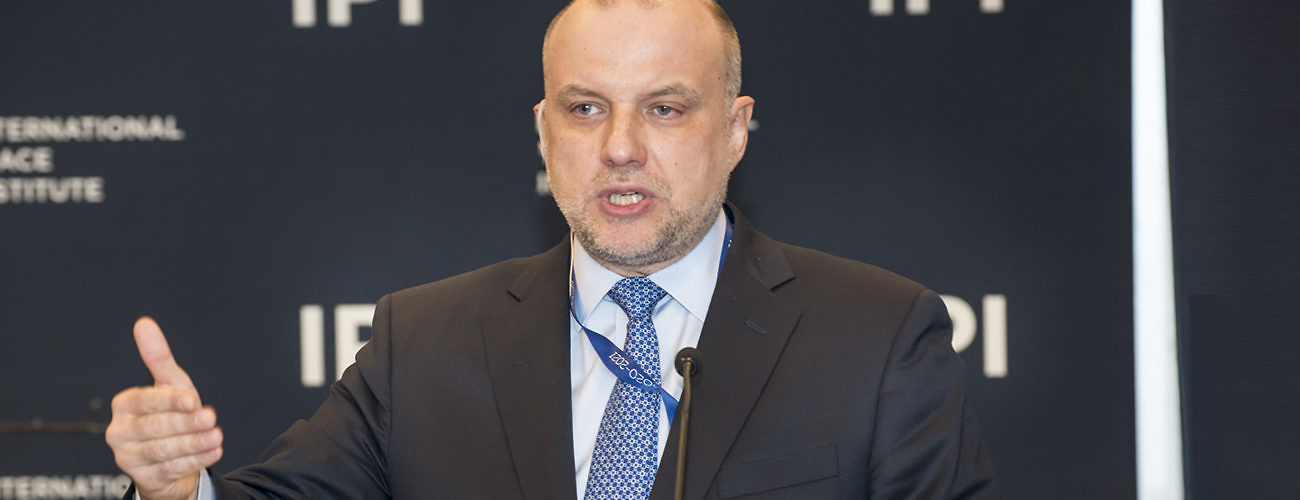Cyberspace has enabled human interaction and helped advance human development, but it has at the same time become a “global, political and military battleground,” said Jüri Luik, the Defense Minister of Estonia, addressing a March 28th IPI forum on European Security in the 21st Century.
Estonia gained firsthand knowledge of that fact earlier than other countries because in 2007, it became the victim of the first state-backed cyberattack on another nation. Angered by the displacement of a statue of a Soviet soldier from a central location in Tallinn, Estonia’s capital city, Russia launched an attack that saw cash machines and media outlets and government bodies in Estonia taken down by levels of internet traffic, spam and unauthorized online requests that swamped servers.
“This first attack by Russia towards Estonia was a very simple and crude attack, but the dubious sort of advantage of it for us was that it was the first one, and it was kind of a signal to everyone,” Mr. Luik said.
Estonians took it as a signal to become a world leader in cybernetics, and today the country’s everyday operating systems and public services are conducted in cyberspace. “We do something that I think no other country in the world does,” he said. “We run our elections on the internet. Now for that, you need a very secure and complicated system of identifying the person who is making the choice as a real person, an Estonian citizen.”
Mr. Luik pointed out that this sophisticated national network, while making Estonia highly modernized, also made it highly vulnerable. “Estonia is a target so it forced us to develop cyber defense capabilities both in a civilian role and also in the military realm,” he said.
A former foreign minister and ambassador both to Washington and Moscow, Mr. Luik is serving as defense minister for the third time, and he recalled that Estonia, and the western world, were slow to react to the threat of cyberattacks from Russia. “I think Russia was given the benefit of the doubt for a very long time, basically because there was a reservoir of goodwill, and some of these separate moves undertaken by our Russian neighbors were not seen in the context of Russia’s general concept of the world and their general approach to foreign policy,” he said. “Now, more and more, we are able to connect the dots.”
He spoke knowingly of the particular challenges of cyber warfare. “Cyberattacks are the most complicated of attacks,” he said. “There are various reasons for that. One is that it is very hard to recognize. I mean, you can easily misinterpret it for something else, it has no pre-warning. For instance, if you are afraid that tanks would come in your way, there are certain indicators, which are viewed as pretty certain signals that a conventional attack is about to start. In cyberspace, there’s nothing like that.”
Also, he noted, you often don’t even know that a cyberattack is underway. “Major attacks can go on as we speak and since the cyberspace and cyber technologies and cyber programming is an ever-evolving thing, then the critical cyber events can be unpredictable in a way that neither the methods nor the protocol can understand. In cyberspace it’s all much more fluid, and cyber knows no borders.”
To assure that dealing with the menace of cyberattacks does not distract from the continuing threat of conventional warfare and taking into account the proximity of Russia and the buildup of the Russian military, NATO has expanded defense missions in Northern Europe, with a British-led mission in Estonia staffed by Denmark and France. “This is an important move by the alliance,” Mr. Luik said, “not to provoke war, but on the contrary to avoid it.”
To contend with the threat of Russia, which Mr. Luik identified as “a risk not just for Estonia but for Europe in general”, there was a particularly high premium on trust between partners, he said. “Cyber defense cooperation is very much built on trust because the information you share with your allies and your supporters is often extremely sensitive. That’s why we have to keep in mind that this cooperation involves a high level of trusting your friends and your partner organizations. And that’s also why most of these collective efforts have failed,” he added. “So there is still huge work to be done.”
The forum was cosponsored by the Permanent Mission of Estonia to the United Nations, and the moderator was IPI Senior Adviser for External Relations Warren Hoge.








